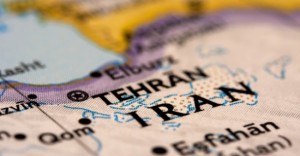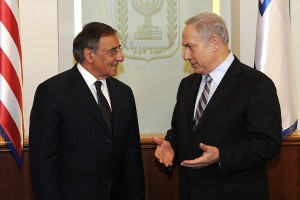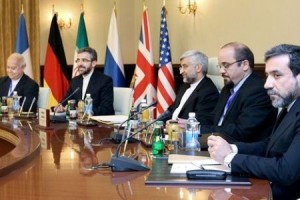I am hearing the drumbeats of war again. They sound so much like the drumbeats of 2002 that I have to wonder whether the old drummers have been brought out of storage to play the same music to a new audience.
This time the drums are directed at Iran. Surely, [...]]]>
 I am hearing the drumbeats of war again. They sound so much like the drumbeats of 2002 that I have to wonder whether the old drummers have been brought out of storage to play the same music to a new audience.
I am hearing the drumbeats of war again. They sound so much like the drumbeats of 2002 that I have to wonder whether the old drummers have been brought out of storage to play the same music to a new audience.
This time the drums are directed at Iran. Surely, the Iranian leadership has not done their people any good with their arrogant defiance and bellicosity in the face of potential massive firepower from the other side. They have also made the situation much worse with some of their comments about Israel, the United States, NATO and others. The Iranian outreach to Hugo Chavez and other unseemly dictators has not helped their cause. Nor has their cause been helped by their interferences in Bahrain, Syria, Lebanon and more. Threatening to close the Strait of Hormuz ratcheted things up. Having fast boats play chicken with warships that could take out the entire coastline of Iran has not been a smart thing to do. Being ambiguous and cagey about their nuclear program gives a lot of verbal ammunition to their enemies.
Indeed, the situation does not look good. The increasing storms in Syria, Iraq, Lebanon, northern Saudi Arabia and Southeastern Turkey could whip up even more trouble in the region.
What are the drums calling for? It seems they are calling for ostensibly tougher sanctions on Iran. However, some of them are calling for the sanctions to be placed in the dustbin of history followed by an attack on Iran.
What do these drums tell us about what might happen after the sorties have attacked Iran? Not much. That part of the percussion piece is almost absent, much like “after Saddam” was barely considered since war on Iraq was seen as a “cakewalk”, “costing $100 billon dollars at most”, and a “slam dunk”.
A strike on Iran will not stop at the strike. Iran will respond. It may even respond globally, according to statements from elements of Iran’s leadership. They could easily respond in Iraq, Syria, Lebanon, Bahrain, and beyond. They could have their sleepers go kinetic in Europe, Latin America and more. They could counterstrike on the oil fields and facilities of other Gulf countries.
Iran could help turn the Strait of Hormuz into a battlefield even if they could not shut it down physically. The price of oil could skyrocket to $250 to $350 per barrel. The world could be plunged into a deeper recession than what happened after 2008.
The world economy is fragile as it is. Ask any Greek, Spaniard, Portuguese, Irish person or Italian. Ask anyone in the US who knows about the potential fiscal cliff, and the possible follow-on recession.
The scenarios of this war could work up massive oil price spikes that could end up producing “new” oil price levels in the medium runs if major facilities and fields are significantly damaged. Then there is the potential nuclear fallout from the attack on Iran that so few want to even whisper about, or even know about.
The drums I am hearing are calling for war. Those playing them don’t seem to want to think about what is on the other side of an attack or, even worse, what a war that protracts and pulls others into it could look like.
Sunni-Shia tensions point to the chances that many could be pulled in. Other factors on the ground in Iran, other Gulf States, the Eastern Mediterranean and more point to a potential disaster than many could hardly imagine at this moment.
How many of those who pushed for war imagined that we would still be in Afghanistan today? Did they predict then, the thousands of lives that have been lost and damaged in Iraq?
War is uncertain. War is much more about fog, blood, pain and shattered lives than armchair strategic thinking. War is about people. It is about young men and women being put in harm’s way and coming back damaged, or not coming back at all.
I am not a pacifist. Sometimes wars are needed. However, I am someone who after decades of studying, living in, working in and worrying about the Middle East and North Africa, can see a potentially massive storm of epic proportions resulting if more missteps are taken.
I cannot sit quietly and idly as the storm builds.
If I don’t speak and write what I believe is the truth to power then I am a failure. I do not intend to be so.
- Paul Sullivan is an internationally recognized expert on security issues including energy security, water security and food security in the Middle East and North Africa. He is an economist by training and a multidisciplinary public intellectual by choice. He is an Adjunct Professor of Security Studies at Georgetown University.
]]>Secretary of Defense Leon Panetta’s trip to the Middle East last week included reassuring Israeli Prime Minister Benjamin Netanyahu, in person, that the U.S. was committed to preventing Iran from obtaining a nuclear weapon — the U.S.’s “red line” on Iran. Panetta reiterated the U.S.’s position, essentially point by point, at [...]]]>
 Secretary of Defense Leon Panetta’s trip to the Middle East last week included reassuring Israeli Prime Minister Benjamin Netanyahu, in person, that the U.S. was committed to preventing Iran from obtaining a nuclear weapon — the U.S.’s “red line” on Iran. Panetta reiterated the U.S.’s position, essentially point by point, at a Pentagon Joint Press Conference with the Japanese Minister of Defense on August 3: “Bottom line is that we have common cause with them with regards to Iran. Our positions are similar. We will not allow Iran to develop a nuclear weapon,” he said in response to a question about the likelihood of an Israeli attack against Iran.
Secretary of Defense Leon Panetta’s trip to the Middle East last week included reassuring Israeli Prime Minister Benjamin Netanyahu, in person, that the U.S. was committed to preventing Iran from obtaining a nuclear weapon — the U.S.’s “red line” on Iran. Panetta reiterated the U.S.’s position, essentially point by point, at a Pentagon Joint Press Conference with the Japanese Minister of Defense on August 3: “Bottom line is that we have common cause with them with regards to Iran. Our positions are similar. We will not allow Iran to develop a nuclear weapon,” he said in response to a question about the likelihood of an Israeli attack against Iran.
When Panetta says that the U.S. and Israeli positions are “similar”, he is acknowledging that they’re not the same, a significant detail considering the growing pressure from Israel and various U.S.-based hawkish Israel advocacy groups and pundits aimed at reforming the U.S.’s policy.
The Israeli “red line” on Iran, at least according to public Israeli statements, is Iran’s acquirement of nuclear weapon building “capability” or Iran crossing into a so-called “zone of immunity” where it can create a nuclear weapon at Fordow, the underground uranium enrichment facility that’s impenetrable by Israeli air strikes. (The Israeli position is confusing according to Colin Kahl and other experts who argue that you can’t bomb knowledge and the Iranians already have nuclear weapon know-how.) Importantly, as the Iranians themselves insist — and U.S. and Israeli defense and intelligence as well as the International Atomic Energy Association (IAEA) reports confirm — the Iranians have not yet made a decision to build a weapon.
Israeli frustration and impatience with the U.S.’s persistent Iran policy may explain why some “Israeli officials” are allowing their press to report statements that hardly seem diplomatic (one might even say appear antagonistic) about their important ally. Just yesterday the English version of Ynetnews reported that
Senior officials on Sunday leveled severe criticism against the US, declaring that the American position on a date for a military strike against Iran was a “wretched red line.”
“The US’ stance is pushing the Iranians to become a country at the brink (of nuclear capability),” explained sources well versed in the nuclear issue. “The Americans are de facto allowing the Iranians to continue to enrich uranium and become a country at the brink. We are not prepared to allow that (to happen).”
Meanwhile, according to an August 3 Haaretz post, Netanyahu is getting very agitated over public scrutiny regarding his plans for Iran — chest-thumping, table-banging mad. But that may be part of a ploy:
Others present at the meeting, however, pointed out that Netanyahu’s comments seemed to be part of the “psychological warfare” campaign that Netanyahu and Defense Minister Ehud Barak are conducting, in order to pressure the U.S. into attacking Iran itself.
At one point during the meeting, a participant asked Netanyahu what he thinks could possibly happen the day after an Israeli strike on Iran. According to one of the meeting’s participants, the question angered Netanyahu. “If an investigative committee is formed, I’ll go and say that I, I am responsible,” said Netanyahu, as he pounded the table, and his chest, with his fist.
The fuming Netanyahu didn’t stop there. “I’ve had enough of this atmosphere,” he said. “It’s also felt in other discussions [on Iran], people keep showing me presentations prepared as if for an investigative committee. I’ve told them to stop with these presentations, stop speaking on protocol, and get to the point,” said Netanyahu.
]]>Netanyahu made it clear to those present that he prefers that the U.S. “do the work,” though he admits that the U.S. is not prepared to pursue a military option at this point.
 Last month in a barely noticed op-ed prominent voices Lee H. Hamilton, Gary Hart and Matthew Hodes strongly recommended focusing on “shared interests” and the “broader issues” that have marred U.S.-Iran relations since the Iranian revolution during renewed talks with Tehran. They reference missed windows of opportunity and expert analysis that we’ve highlighted here before from diplomatic cold war veterans Thomas Pickering and William Luers and the national security-focused Stimson Center before concluding that hawkish rhetoric should be resisted in favor of serious diplomacy:
Last month in a barely noticed op-ed prominent voices Lee H. Hamilton, Gary Hart and Matthew Hodes strongly recommended focusing on “shared interests” and the “broader issues” that have marred U.S.-Iran relations since the Iranian revolution during renewed talks with Tehran. They reference missed windows of opportunity and expert analysis that we’ve highlighted here before from diplomatic cold war veterans Thomas Pickering and William Luers and the national security-focused Stimson Center before concluding that hawkish rhetoric should be resisted in favor of serious diplomacy:
As we approach the next round of negotiations, we must beware of extreme voices that will want to limit the conversation to an expansion of threats — a structure of confrontation or capitulation. Bellicose words can box us in just as they can box in the Iranians, making a military confrontation more likely. We would be better served by quiet, frank discussions about our respective interests and our potentially shared interests. We should never forget that during the Cold War, we faced an adversary that was equipped and prepared to destroy us and our allies. But while we never let our guard down, we nevertheless looked for opportunities to cooperate. Eventually, we found areas of mutual interest that helped build confidence in our ability to manage that complicated relationship. That policy worked for us during the Cold War; it should work for us with a regional actor today.
The authors’ bottom line is that any deal will require moving beyond the confines of the nuclear issue and working to realign Iran’s behavior and relationship with the international community without increasing the probability of military confrontation. Their words are all the more weighty because of their impressive credentials. Rep. Hamilton represented Indiana for 34 years and was the ranking Democratic chairman of the House Foreign Affairs Committee. He previously headed the Woodrow Wilson International Center for Scholars, co-chaired the Iraq Study Group Report and was the vice chairman of the 9/11 Commission. Sen. Hart was the former frontrunner for the Democratic nomination in 1988 and has been heavily involved in national security consulting since leaving politics. For his part, international relations expert Matthew Hodes is the Executive Director of the bipartisan Partnership for a Secure America where Hamilton and Hart are advisory board members. (Interestingly, an IPS News investigation revealed that Hamilton had been paid a “substantial amount” in 2011 to appear at panel for the U.S.-terrorist designated Mujahideen-e-khalq (MEK). Hamilton told reporter Barbara Slavin that he was not aware of the group’s true nature at the time.)
Their article’s title, “Enlarging the Frame”, sums up what some analysts are arguing needs to be done as expectations for the next round of talks flip flop between periods of optimism and pessimism almost daily based on each and every development that is reported. Writes Lobe Log’s own Peter Jenkins who previously served as the United Kingdom’s former permanent representative to the International Atomic Energy Association (IAEA):
]]>US frustration over Iranian refusal to meet bilaterally is understandable. But Iran’s position is not incomprehensible. The Supreme Leader has made very clear that he has no confidence in the US. “[Americans] break their promises very easily. they feel no shame…they simply utter lies.” The trust deficit is not one-sided. Mutual confidence-building is required.
Surely the right call at this point is not to tear up the script and start afresh, but to try to come up with a better package of incentives and to set up a mechanism that permits intensive negotiation?
Harrop, a faculty expert on Iran at [...]]]>
Harrop, a faculty expert on Iran at the University of Virginia, also searches out the idea of “mutual respect” in Obama’s personal biography and even its appearances in his writings. Harrop notes the use of the phrase throughout the history of the Islamic Republic, from the leader of the revolution, Ayatollah Ruhollah Khomeini to current president Mahmoud Ahmadinejad.
But Harrop concludes that the policies pursued by the administration don’t match up with Iranian expectations of “mutual respect” (my emphasis):
In his Administration’s zeal to obtain greater international support for further sanctions, President Obama vowed to ensure that the “international message” to Iran was unified and unmistakable. Yet he was apparently tone deaf about how that message of pressure was actually received inside Iran. Obama might rationalize that “biting” Iran economically is better than military force, but he disregards how such pressures will be deemed by Iran as contradicting professions of respect. More likely, they are driving Iran away from the table, or at best, making it more difficult.
The key problem reduces to not comprehending what “mutual respect” means to Iran. Sanctions, pressures, and threats are inimical to the ideal of mutual respect — a sure fire way to demonstrate that seemingly pleasing words to a Western ear will be rendered as a trick, a disrespectful deceit, to an Iranian ear.
Here’s the abstract and here’s the PDF of the whole article.
]]>